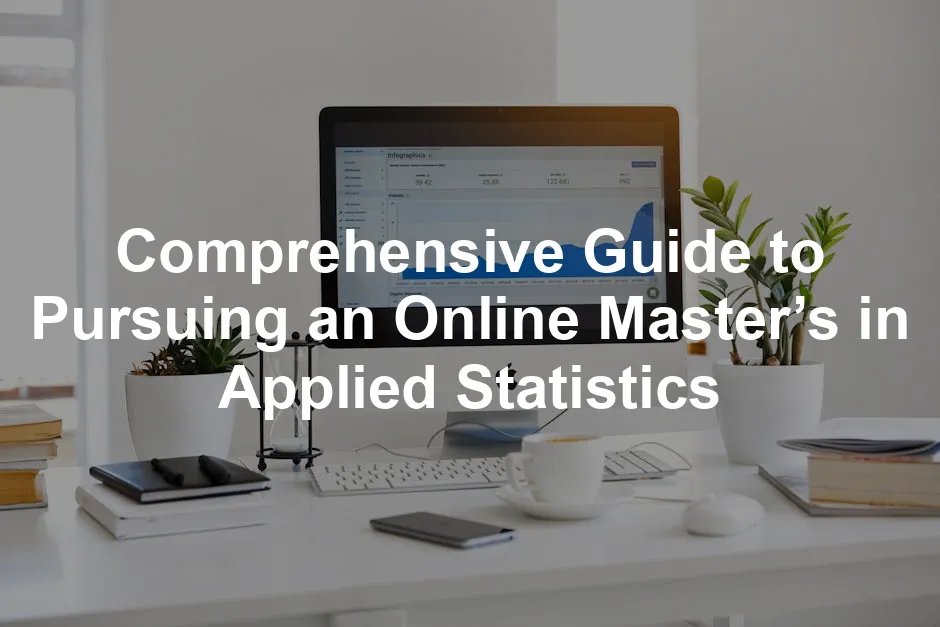Introduction
The demand for data professionals is skyrocketing! Companies are scrambling to find experts who can turn raw numbers into actionable insights. With industries relying heavily on data analytics, now is the perfect time to consider furthering your education in applied statistics.
So, what exactly does a Master’s in Applied Statistics entail? It’s a specialized program that equips students with the skills to analyze data using various statistical techniques. You’ll learn to gather, process, and interpret vast amounts of information. The beauty of this degree is its practical approach—you’re not just crunching numbers; you’re learning to tell compelling stories with data.
In today’s data-driven job market, analytical skills are more critical than ever. Employers seek professionals who can navigate complex datasets and communicate findings effectively. Whether in healthcare, finance, or technology, statistical expertise can open doors to exciting career opportunities. For a deeper dive into the world of statistics, consider picking up Naked Statistics: Stripping the Dread from the Data by Charles Wheelan. It’s a fun read that makes statistics less intimidating!
This article aims to be your trusty compass on the journey toward earning your MS in Applied Statistics online. We’ll cover essential programs, skills you’ll gain, career prospects, and much more. Buckle up as we embark on this enlightening exploration of online applied statistics education!

Understanding Applied Statistics
What is Applied Statistics?
Applied statistics is the field dedicated to solving real-world problems using statistical methods. It’s all about applying statistical techniques to analyze and interpret data, making it a vital component across various industries. Whether you’re working in healthcare, finance, or even sports analytics, applied statistics plays a crucial role.
But how does it differ from theoretical statistics? While theoretical statistics focuses on the underlying principles and theories, applied statistics emphasizes practical applications. In simple terms, applied statisticians are the superheroes who swoop in to make sense of numbers in everyday scenarios, turning complex data into clear insights.
Importance of Online Learning
With the rise of online education, pursuing a Master’s in Applied Statistics has never been more accessible. One of the key benefits? Flexibility! You can balance your studies with work or other commitments without sacrificing quality education.
Online programs offer a wealth of resources and interactions with faculty and peers, all from the comfort of your home. This means you get to engage with top-notch instructors and fellow aspiring data wizards, no matter where you live. Even if your schedule is packed, you can still dive into the world of applied statistics at your own pace, making it an attractive option for working professionals and busy students alike. To get started on this journey, check out Statistics for Dummies by Deborah J. Rumsey. It’s a great starter book for anyone diving into statistics!

Choosing the Right Program
Factors to Consider
Accreditation and Reputation of the Institution
First things first: accreditation matters. Ensure the program is accredited by a recognized body. This guarantees the quality of education you’ll receive. A degree from an accredited institution holds more weight in the job market. Check reviews and testimonials from alumni to gauge the program’s reputation. A well-regarded school can significantly boost your credentials.
Curriculum Focus: Statistical Science vs. Data Science Specializations
Next, think about what you want to study. Many programs offer specializations in Statistical Science or Data Science. Statistical Science focuses on traditional statistical methods, while Data Science dives deeper into big data, machine learning, and predictive analytics. Choose based on your career goals. If you’re a fan of coding and algorithms, Data Science might be right for you. On the other hand, if you prefer foundational statistical techniques, go with Statistical Science. If you want to get a comprehensive understanding, consider reading The Data Warehouse Toolkit: The Definitive Guide to Dimensional Modeling by Ralph Kimball. It’s essential for understanding data architecture!
Duration and Flexibility of the Program
Flexibility is one of the biggest perks of online education. Look for programs that allow you to study at your own pace. Some programs can be completed in as little as a year, while others may take two years or more. Consider your current commitments and choose a program that fits your schedule. Does the program offer asynchronous courses? Can you balance work and studies? The right program will provide the flexibility you need.

Top Online MS in Applied Statistics Programs
Now that you know what to look for, let’s explore some of the top online programs available.
1. Colorado State University
Colorado State University’s online Master of Applied Statistics program stands out for its comprehensive curriculum. Students can specialize in either Statistical Science or Data Science. The faculty comprises seasoned professionals who bring real-world experience into the classroom. Unique features include a capstone project that allows you to apply what you’ve learned in a practical setting. Plus, the hands-on learning experience is invaluable for job readiness. To enhance your skills, consider diving into Applied Multivariate Statistical Analysis by Richard A. Johnson.

2. Penn State University
At Penn State, the Master of Applied Statistics offers a robust curriculum designed for real-world applications. Students dive into statistical modeling, data analysis, and software tools like R and SAS. The program emphasizes statistical consulting, preparing graduates for a variety of roles. Graduates rave about the support from career services, which provides guidance from day one. Their positive testimonials highlight how the program has propelled their careers forward. To keep your skills sharp, consider R for Data Science by Hadley Wickham.
3. University of Delaware
The University of Delaware’s online MS in Applied Statistics focuses on practical applications. Students gain proficiency in essential statistical software, including SAS and R. The program also emphasizes case studies and real-world data analysis. Research opportunities abound, and students can connect with industry professionals, making it easier to network and find job opportunities post-graduation. If you want to understand the business side of data, explore Data Science for Business by Foster Provost and Tom Fawcett.
4. Purdue University
Purdue’s online Master of Science in Applied Statistics is known for its strong emphasis on computational tools. The curriculum covers essential statistical methods and experimental design. Students participate in a capstone consulting experience, allowing them to work on real projects with faculty guidance. This hands-on approach prepares graduates to tackle complex problems in various industries. To further enhance your understanding of data visualization, you might want to check out Data Visualization: A Practical Introduction by Kieran Healy.
5. Other Notable Programs
Several other programs are worth mentioning. Michigan Tech offers an engaging curriculum focused on data-driven decision-making. The University of Oklahoma provides a flexible online format with a strong industry focus. Strathclyde University also presents a comprehensive online MSc in Applied Statistics, perfect for those wanting a conversion course. These institutions are excellent options for advancing your education and career in applied statistics. To learn more about the breadth of data science, consider The Data Science Handbook by Carl Shan.

Choosing the right online MS in Applied Statistics is crucial for your future. Consider these factors carefully, and explore the top programs to find the best fit for you. With the right education, you’ll be well-equipped to navigate the exciting world of data and statistics.
Curriculum Overview
Core Courses
In an online Master’s in Applied Statistics, students encounter a robust curriculum. The core courses are designed to equip them with essential statistical knowledge and practical skills. Key subjects typically include Regression Analysis, Experimental Design, and Data Mining, which lay the groundwork for advanced statistical techniques.
Regression Analysis teaches how to model relationships between variables. It’s like being a detective—finding out how one variable influences another. Imagine trying to predict your friend’s mood based on the weather. This course gives you the tools to do just that, but with data. To further your understanding, consider Practical Statistics for Data Scientists by Peter Bruce and Andrew Bruce.

Experimental Design is all about structuring experiments effectively. Students learn to plan how to gather data so that the results are valid and reliable. Think of it as organizing a party—if you want to know whether your friends prefer pizza or tacos, you need a good plan to ask them!
Data Mining dives into extracting valuable insights from large datasets. Here, students harness statistical software tools like R, SAS, and Python. Proficiency in these tools is vital. After all, what good is a treasure map if you can’t read it? These programming languages help students analyze data and visualize results, making complex information easily digestible. For a practical approach to data science, consider Data Science from Scratch by Joel Grus.
Statistical software plays a crucial role throughout the coursework. Students learn to utilize these tools to perform analyses and create visual representations of data. Mastering software like R and Python can set you apart in the job market. Employers love candidates who can transform data into actionable insights, and knowing the right software is half the battle.

Elective Courses
Beyond core classes, elective courses allow students to specialize and tailor their education. Popular options include Bayesian Statistics and Multivariate Data Analysis. Each elective dives deeper into specific areas, offering a chance to explore topics aligned with personal interests or career goals.
Bayesian Statistics introduces students to a different perspective on probability. This approach allows statisticians to update their beliefs based on new evidence. It’s like being a sports analyst who adjusts predictions as the game unfolds. This flexibility is invaluable in today’s fast-paced data landscape. Learn more about Bayesian statistics and its applications.
Understanding Bayesian statistics can provide a different perspective on probability and its applications. Explore more about Bayesian statistics here.
Multivariate Data Analysis focuses on methods for analyzing data involving multiple variables simultaneously. Imagine trying to figure out what factors influence your favorite movie. Is it the plot, actors, or director? This course helps students untangle those relationships, a skill highly sought after in fields like marketing and social sciences.
Real-world applications of these electives can be seen across various industries. For instance, Bayesian Statistics is widely used in medical research for making predictions based on patient data. Multivariate Data Analysis is crucial in market research, helping companies understand consumer behavior by analyzing multiple factors. If you’re looking for more resources, check out Machine Learning Yearning by Andrew Ng.
Overall, the curriculum in an online Master’s in Applied Statistics blends foundational knowledge with specialized skills, preparing students for a range of careers in the data-driven economy.

Skills Acquired through the Program
Analytical and Technical Skills
Completing an online Master’s in Applied Statistics equips students with a treasure trove of analytical and technical skills. These skills are essential for anyone looking to make an impact in data-centric roles.
Data Visualization is a key skill gained in the program. Students learn to create compelling visual representations of complex data sets. Imagine turning a mountain of numbers into a colorful chart that tells a story. This ability to visualize data not only aids in understanding but also enhances presentations. After all, a picture is worth a thousand words! If you’re looking for a great resource on this topic, check out Storytelling with Data by Cole Nussbaumer Knaflic.
Statistical Modeling is another crucial area of focus. Students learn to develop models that predict outcomes based on varying inputs. This skill is like having a crystal ball, allowing you to forecast future trends based on historical data. Whether it’s predicting sales figures or analyzing election results, statistical modeling is a game changer.
Hypothesis Testing further refines analytical skills. It teaches students how to validate assumptions using statistical evidence. Imagine trying to prove that your favorite ice cream flavor is the best. You’ll need to collect data and test your hypothesis against the competition. This skill is invaluable in research and business, enabling data-driven decision-making. Check out this comprehensive guide on hypothesis testing.
Mastering hypothesis testing is crucial for validating assumptions in various fields. Learn more about hypothesis testing here.
Together, these analytical and technical skills prepare graduates to tackle real-world challenges. Employers seek individuals who can analyze data, visualize results, and derive meaningful insights. With these competencies, you’ll be well-equipped for roles in various industries, from healthcare to finance.
The combination of core and elective coursework, along with the development of critical skills, ensures that graduates are ready to thrive in a competitive job market. Whether you’re a data enthusiast or looking to switch careers, an online Master’s in Applied Statistics offers the tools and knowledge to help you succeed.

Career Prospects
Job Market Overview
The job market for statisticians and data scientists is hotter than a summer sidewalk! With businesses increasingly relying on data-driven decisions, the demand for skilled professionals is soaring. As of now, the U.S. Bureau of Labor Statistics projects a staggering 33% growth rate for statisticians from 2020 to 2030. This is significantly faster than the average for all occupations. Employers are on the lookout for individuals who can turn raw data into actionable insights, driving innovation and efficiency across various sectors.

Potential Career Paths
With an MS in Applied Statistics, a world of opportunities awaits you. Statisticians and data analysts are just the tip of the iceberg. Here are some popular roles you might consider:
- Data Analyst: Transform complex data into clear insights. Play detective with numbers to uncover trends!
- Statistician: Apply statistical methods to solve real-world problems. Your analytical skills will be in high demand.
- Research Scientist: Conduct experiments and analyze data to advance scientific knowledge. Your findings could change the world!
- Quality Assurance Analyst: Ensure products meet quality standards by analyzing data from tests and experiments.
- Machine Learning Engineer: Dive into the exciting realm of artificial intelligence, creating models that learn from data.
Industries that require applied statistics expertise include:
- Healthcare: Analyze patient data for better treatment outcomes. Your work could save lives!
- Finance: Help companies make informed investment decisions based on statistical analysis.
- Government: Work on public policy using data to drive decisions that affect communities.
- Retail: Analyze consumer behavior to optimize sales strategies and marketing efforts.
Salary Expectations
Now, let’s talk numbers—because who doesn’t love a good paycheck? According to PayScale, the median annual salary for statisticians sits around $71,804, while data scientists can rake in approximately $90,797. But remember, these figures can vary based on several factors:
- Experience: The more you know, the more you earn! Entry-level positions typically offer lower salaries, but with experience, you can climb the ladder.
- Industry: Some sectors pay better than others. For instance, finance and healthcare often offer higher salaries due to the critical nature of the work.
- Location: Working in urban areas or tech hubs like Silicon Valley can lead to higher earnings due to the cost of living and demand for data professionals.
In summary, pursuing an online Master’s in Applied Statistics not only opens the door to exciting career paths but also positions you for a lucrative salary. With a growing job market and diverse opportunities, you’ll be armed with the skills needed to thrive in today’s data-driven landscape. So, get ready to crunch some numbers and make your mark!

How to Apply
Admission Requirements
Ready to take the plunge into the world of applied statistics? First, let’s tackle the admission requirements. Most programs have some typical prerequisites. Expect to show off your calculus skills. Ideally, you should have completed three semesters of calculus. A course in linear algebra also helps, along with at least one undergraduate-level statistics class. These foundational courses set you up for success in your future studies.
Next up is the required documentation. When applying, you’ll need to submit official transcripts from all institutions you’ve attended. These transcripts showcase your academic achievements, so make sure they reflect your best work. Additionally, most programs will ask for two professional letters of recommendation. These letters should come from individuals who can vouch for your skills and potential in statistics.
A personal statement is also crucial. Think of it as your chance to shine! Use this document to explain your motivation for pursuing this degree. Talk about your career goals and how this program aligns with them. This is your opportunity to show the admissions committee your passion for statistics.
Lastly, some programs may require standardized test scores, like the GRE. However, many institutions are moving away from this requirement, so check the specifics for each program you’re considering.

Application Timeline
Now that you know what’s needed, let’s discuss the application timeline. Important deadlines vary by program, but a common one is the fall semester application, which typically falls around mid-April. Be sure to check each school’s website for their specific dates, as they can differ.
To prepare a robust application, start early! Gather your transcripts and recommenders well before the deadline. This way, you won’t be scrambling last minute. Also, give yourself ample time to write your personal statement. You want to craft a thoughtful, compelling narrative that captures your enthusiasm for applied statistics.
Consider creating a checklist to keep track of all necessary documents. That way, you’ll know exactly what to submit and when. It’s also wise to review the application requirements of multiple programs. This ensures you meet all criteria and can tailor your application accordingly.
Another pro tip? Reach out to admissions offices if you have questions. They’re there to help, and a quick email can clarify any uncertainties. Remember, a strong application can set you apart from other candidates.
By being proactive and organized, you’ll be well on your way to applying for a Master’s in Applied Statistics!

FAQs
Is a thesis required for the online MS in Applied Statistics?
Most programs require a capstone project instead of a thesis. This project typically involves practical applications of what you’ve learned. It’s a chance to showcase your skills in a real-world setting, which many students find beneficial.
Can I complete the program at my own pace?
Yes! Many online MS in Applied Statistics programs offer flexible scheduling. You can often choose to take courses at your own pace, allowing you to balance work, family, and studies effectively.
What statistical software will I learn?
You’ll gain experience with essential tools such as R, Python, SAS, and SPSS. Familiarity with these software packages is crucial, as they are widely used in the industry for data analysis and statistical modeling.
What if I have a non-statistics background?
No worries! Many programs welcome students from diverse academic backgrounds. While some foundational knowledge in mathematics and statistics is beneficial, many institutions offer bridge courses to help you catch up.
Are there financial aid options available?
Absolutely! Most programs provide various financial aid resources, including scholarships and grants. Be sure to research the options available at each institution to maximize your funding potential.
Conclusion
Pursuing a Master’s in Applied Statistics is a decision that can significantly impact your career. In an age where data is king, having advanced statistical skills is not just beneficial; it’s essential. Employers across various industries are on the lookout for experts who can analyze data effectively and provide insights that drive decision-making.
A master’s degree in this field equips you with the knowledge and tools to tackle complex problems. You’ll dive into courses that enhance your analytical skills, statistical modeling, and data visualization techniques. With these skills, you can stand out in the job market, opening doors to exciting career opportunities.
Consider the ripple effects of your expertise. By understanding data, you can help organizations make informed decisions that lead to success. Whether in healthcare, finance, or technology, your skills can contribute to advancements and improvements in society. To further your knowledge, consider reading Deep Learning with Python by Francois Chollet.
So, if you’re contemplating further education in applied statistics, take that leap! The world is hungry for data professionals like you. As you embark on this educational journey, remember: statistical expertise is not just a ticket to a job; it’s a chance to make a difference in today’s data-centric world.
Please let us know what you think about our content by leaving a comment down below!
Thank you for reading till here 🙂
All images from Pexels




